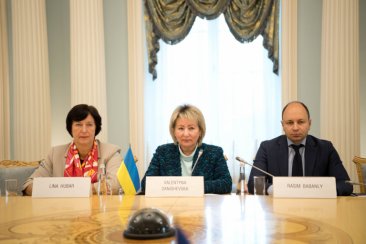Contact center of the Ukrainian Judiciary 044 207-35-46

The Supreme Court hosted a meeting with representatives of the Council of Europe to discuss the implementation of the judgments of the European Court of Human Rights by Ukraine.
The President of the Supreme Court Valentyna Danishevska thanked the CoE Office in Ukraine for participating in the discussion of sensitive issues for the judiciary and for fruitful cooperation, in particular, within the project "Further support for the execution by Ukraine of judgments in respect of Article 6 of the European Convention on Human Rights." She also assured that the judiciary was trying to work with other branches of government to address the conceptual flaws of public administration that lead to human rights violations.
"The excessive length of court proceedings is a painful issue for Ukraine. In conditions of instability, judges are increasingly leaving the system, and the absence of the High Qualification Commission of Judges prevents us from filling vacant posts. Today, Ukraine lacks a third of the required number of judges. Therefore, it is now quite difficult to talk about specific changes in the length of case consideration. In addition, we all understand that an excessive number of cases is the enemy of the quality of court decisions," said the President of the Supreme Court.
Pavlo Pushkar, Head of Division of the Department for the Execution of ECtHR Judgments of the Directorate General for Human Rights and the Rule of Law of the Council of Europe, noted that the Supreme Court is a key and reliable partner of the Council of Europe in enforcing ECtHR judgments and implementing the Convention.
According to him, the CoE Committee of Ministers drew attention to the need to adopt a law aimed at restarting the work of the HQCJ, and at the same time stressed that it should be implemented in accordance with the norms and standards of the Council of Europe, ECtHR case law and the requirements of the Convention.
"The resumption of the work of the High Qualification Commission of Judges and the beginning of the process of filling vacant positions of judges is an important part of the implementation of the judgments of the European Court of Human Rights," Pavlo Pushkar is convinced.
He also stressed that the Council of Europe was interested in further cooperation and was ready to provide expert assistance in the process of introducing judicial reform in order to promote compliance with European standards in this field.
In addition, the participants outlined some risks of the next stage of judicial reform and discussed the establishment of a competition commission of the HQCJ and the Ethics Council of the High Council of Justice.
"Now, during the vetting process of HCJ members, the question of re-evaluation of judges arises. After all, most judges who work in the HCJ are judges who have already passed it. Both the Venice Commission and the ECtHR saw the qualification evaluation as a consequence of the revolutionary events, as an exceptional one-off event. However, the next stage of judicial reform involves re-evaluation for judges - HCJ members. This approach opens a dubious and unconstitutional way of exerting pressure on judges. It was this kind of pressure that was mentioned in the judgment of the ECHR “Volkov v. Ukraine”, and since 2014 Ukraine has been working to get rid of it. Unfortunately, we are going back to the old problems and now we must make this pressure impossible. We do not deny the existence of the Ethics Council, but only those who have not yet been vetted should be vetted," said Valentyna Danishevska.